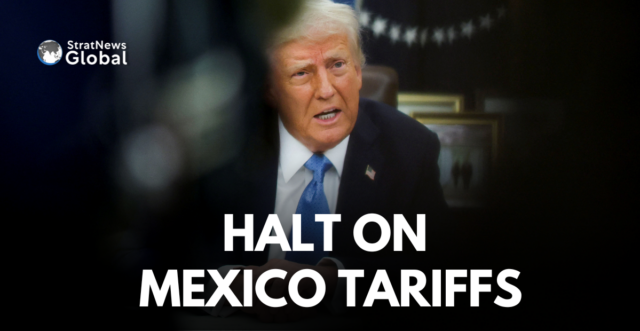U.S. President Donald Trump will pause new tariffs on Mexico for one month after Mexico agreed to reinforce its northern border with 10,000 National Guard members to stem the flow of illegal drugs, particularly fentanyl, he said on Monday on social media.
Mexican President Claudia Sheinbaum said the agreement also includes a U.S. commitment to act to prevent the trafficking of high-powered weapons to Mexico. The two leaders spoke by phone on Monday, just hours before U.S. tariffs on Mexico, China, and Canada were set to take effect.
The two countries will use the month-long pause to engage in further negotiations, Trump said.
U.S. stocks and other global financial markets slumped on the looming tariffs, while world leaders responded to Trump’s threats to expand tariffs to the European Union as well.
The benchmark S&P 500 fell 1.7% at the opening bell, on the heels of the year’s biggest daily losses on a string of Asian and European bourses over fears of an economically damaging trade war.
Trump said on Monday he had spoken with Canadian Prime Minister Justin Trudeau and would do so again at 3 p.m. ET (2000 GMT). Both Canada and Mexico had announced retaliatory tariffs of their own. The tariffs on Canada and China remain poised to take effect on Tuesday.
EU Next?
Speaking in Washington on Sunday after returning from his Mar-a-Lago estate, Trump indicated that the 27-nation European Union would be next in the firing line, but did not say when.
“They don’t take our cars, they don’t take our farm products. They take almost nothing and we take everything from them,” he told reporters.
EU leaders meeting at an informal summit in Brussels on Monday said Europe would be prepared to fight back if the U.S. imposed tariffs, but they also called for reason and negotiation.
Arriving at the talks, French President Emmanuel Macron said if the EU were attacked in its commercial interests it would have to “make itself respected and thus react”.
Chancellor Olaf Scholz of Germany said the bloc could respond if necessary with its own tariffs against the U.S., but stressed it was better for the two to find an agreement on trade.
Trump hinted that Britain, which left the EU in 2020, might be spared tariffs, saying: “I think that one can be worked out”.
The U.S. is the EU’s largest trade and investment partner. According to the Eurostat data from 2023, the United States had a deficit of 155.8 billion euros ($161.6 billion) with the EU in the trade of goods, offset by a surplus of 104 billion euros in services.
EU foreign policy chief Kaja Kallas said there were no winners in a trade war, and if one broke out between Europe and the United States, “then the one laughing on the side is China”.
Markets Swoon
Economists say the Republican president’s plan to impose 25% tariffs on Canada and Mexico and 10% tariffs on China would slow global growth and drive prices higher for Americans.
Trump says they are needed to curb immigration and narcotics trafficking and spur domestic industries.
Financial market reaction on Monday reflected concerns about the fallout from a trade war. Shares in Tokyo ended the day down almost 3% and Australia’s benchmark – often a proxy trade for Chinese markets – dropped 1.8%. The mainland China market was shut for the Lunar New Year holidays.
Around lunchtime in Europe, Germany’s DAX index was down 1.8%, France’s CAC was down 1.9%, and Britain’s FTSE 100 was down 1.5%.
The Chinese yuan, Canadian dollar, and Mexican peso all slumped against a soaring dollar. With Canada and Mexico the top sources of U.S. crude oil imports, U.S. oil prices CLc1 jumped more than 1%, while gasoline futures RBc1 rose nearly 3%.
Trump’s tariffs will cover almost half of all U.S. imports and would require the United States to more than double its own manufacturing output to cover the gap – an unfeasible task in the near term, ING analysts wrote.
(with inputs from Reuters)





